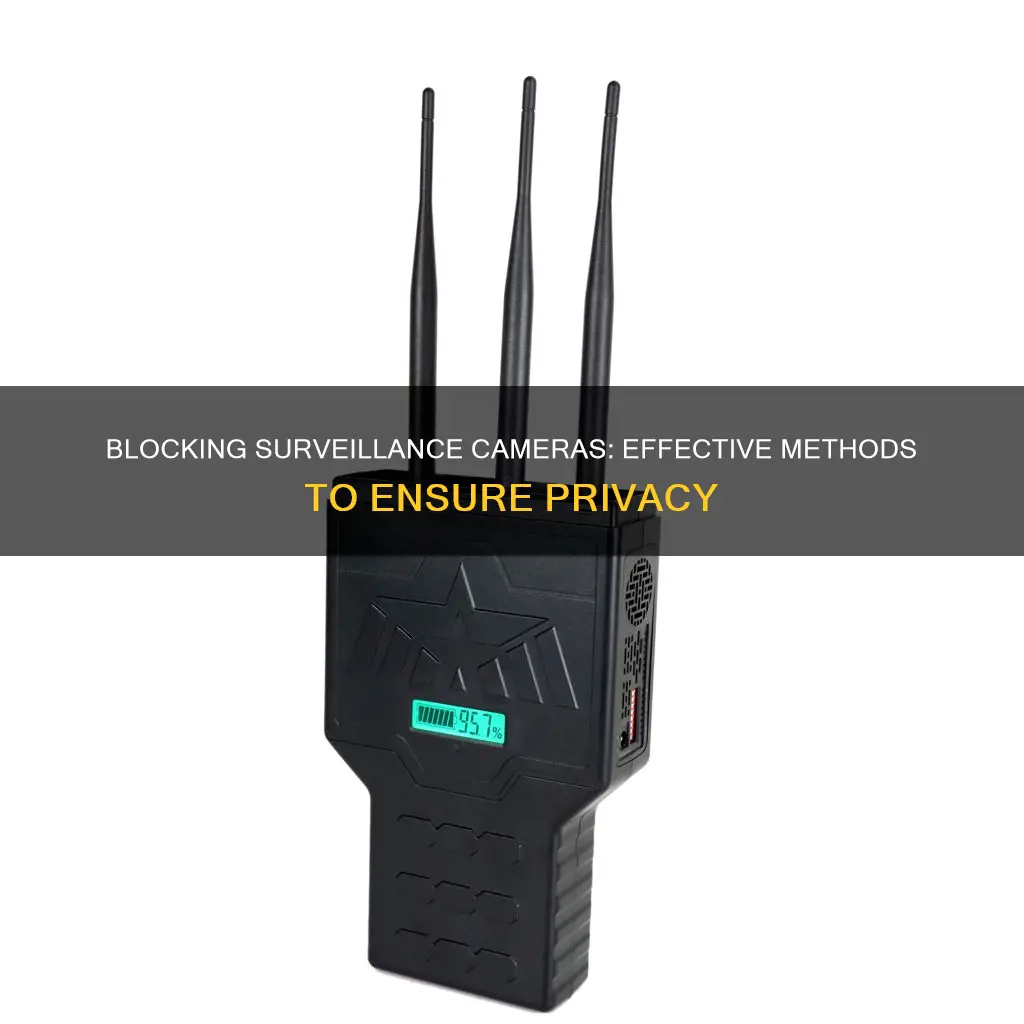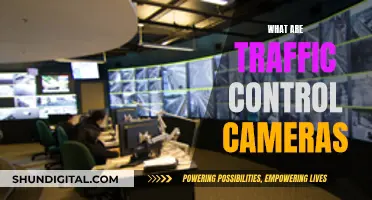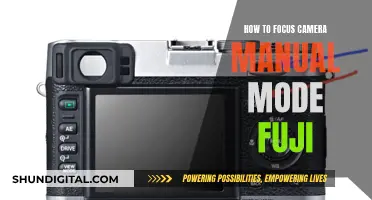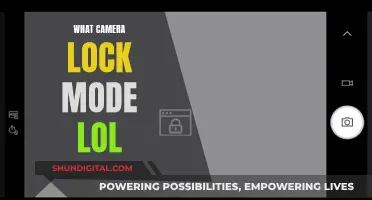
Surveillance cameras are a great way to protect your home from intruders and illegal activities. However, they can also be an invasion of privacy, especially if they are pointed at your property or capture your private space. If you're feeling uncomfortable with a neighbour's security camera, there are a few things you can do to block it without resorting to illegal methods. Here are some ways to do it:
- Talk to your neighbour: Communicate your concerns and politely ask them to adjust the angle or change the direction of their camera.
- Seek help from a third party or mediator: If talking to your neighbour doesn't work, you can seek help from a local community organisation or mediation centre.
- Install your security camera: Fight fire with fire by installing your own legally placed security camera on your property.
- Cover the lens: You can try to cover the camera lens with a viscous substance, tape, a bag, or fabric. However, this may trigger motion detection and is not very practical.
- Use a powerful light: Shine a powerful LED light or flashlight directly into the camera lens to blind it. This method works best in the dark or enclosed spaces.
- Use an infrared laser: Point an infrared laser directly into the camera lens. This method is more subtle but requires precision as the camera will capture your face if the laser slips away from the lens.
- Plant trees or shrubs: Block the camera's view by planting tall trees or shrubs in front of it.
- Install a privacy fence or curtains: Use physical barriers such as fences, curtains, or shades to block the camera's view.
| Characteristics | Values |
|---|---|
| Confirm if the camera is real | Check for a red light at night or wires connected to the camera |
| Confirm if the camera is fake | Check for a lack of a red light at night or no wires connected to the camera |
| Talk to the camera owner | Politely ask them to adjust the angle or change the direction of the camera |
| Seek help from a third party or mediators | Go to your local community justice or neighborhood mediation center |
| Install your own security camera | Install a Pan-Tilt-Zoom (PTZ) security camera |
| Talk to the police or a lawyer | Report the camera owner for voyeurism |
| Block the camera's view | Use tall shrubs, grown trees, curtains, fences, or cloths |
| Blind the camera | Use a powerful LED, an infrared laser, or cover the lens with an opaque substance |
| Jam the camera | Use a camera jammer that emits a frequency to jam the camera's signal |
What You'll Learn

Confirm if the camera is real or fake
Confirming whether a security camera is real or fake can be tricky, as fake cameras are becoming increasingly sophisticated, with some even featuring motion sensors and fake cables. However, there are several indicators that can help you determine whether a camera is real or fake:
IR LED Lights
Most modern security cameras have infrared (IR) lights that enable them to see at night. These IR lights appear as small, dull red dots inside the lens of the camera. Fake cameras, on the other hand, rarely have IR lights. If you look into the lens, you may not see any lights at all. Some fake cameras may have a blinking red light, but this is usually located on the hardware rather than inside the lens. Additionally, fake cameras with IR lights will often flash red during the daytime, whereas real cameras won't.
Cables
Real security cameras typically have a single thick cable, similar to a standard home internet cable. Fake cameras, on the other hand, often have multiple thin cables. However, some newer dummy cameras also have visible fake cables, so it's not a foolproof indicator.
Build Quality and Materials
Real security cameras are generally made of sturdy, high-quality materials, such as water-proof aluminum. Fake cameras, on the other hand, are often made of cheap plastic and may feel very lightweight, indicating that there are no internal components.
Branding
Most legitimate security cameras will feature branding, such as a company name, logo, or custom font. A complete absence of branding is a strong indication that a camera is fake. Some fake cameras may have made-up branding or stickers, but these are less common as they increase manufacturing costs. If you're unsure, you can always Google the brand to verify its legitimacy.
Installation and Placement
Real security cameras are often installed with care, with cables properly piped or hidden inside moldings. Fake cameras, on the other hand, may be simply placed on a wall with exposed or poorly managed cables. Additionally, outdoor security cameras need to be made of sturdy materials to withstand the elements. A cheap plastic camera will likely degrade quickly when exposed to sunlight and harsh weather conditions.
Deleting Adobe Camera Raw Cache: What You Need to Know
You may want to see also

Talk to the camera owner
Talking to your neighbour about their security camera is a good first step to take. It is possible that they are unaware that their camera is aimed at your property or invading your privacy. Politely ask them if they can adjust the angle or change the direction of the camera.
If your neighbour is unreasonable, you can seek help from a third party or mediator, such as your local community justice or neighbourhood mediation centre. They can mediate a meeting between you and your neighbour to settle the problem without further escalation.
If you feel that your neighbour is deliberately invading your privacy, you can also contact the police or a lawyer for advice. Voyeurism is not something to be tolerated, and you have the right to mention this to the authorities.
Argus Cameras: Where Are They Manufactured?
You may want to see also

Seek help from mediators
If you have an unreasonable neighbour and your talk ends in failure, seeking help from mediators may be useful to disable the security cameras.
You can find mediators in your local community service or neighbourhood mediation centres. Explain your situation and they will get right on it. They are constantly bombarded with the same issues regarding neighbours and security cameras, so they will know what to do. They usually organise mediated meetings between neighbours and serve as a third party to disputes so that both sides can settle any issues of note, such as negligently pointed security cameras.
Mediation centres can mediate a meeting between you and your neighbour to settle the problem without further escalation. They can help you and your neighbour settle any issues, such as security cameras that are negligently pointed at your property.
If you feel that your privacy is being violated, or that security cameras are causing you stress, you can feel free to block them. However, please keep in mind that directly destroying the camera can make problems worse.
It is important to first determine if your neighbour's security camera is real. Due to budget constraints, many people will buy realistic-looking but completely fake security cameras online to act as a deterrent to thefts. However, these fake cameras can be too realistic and mislead you.
There are two ways to figure out whether the camera is real or not. The first one is to observe whether the camera has a red light flashing at night. If it does, it means that the security camera is working well. But if not, it cannot be completely sure that it is fake, because if the security camera is powered off, there will be no red light. Some cameras may use light in other colours or no visible light at all.
Then the second method becomes necessary: directly ask your neighbour. This is the most direct and easiest way. Good communication can solve all problems.
Politeness is very important in communication. You should politely discuss with your neighbour about the cameras pointing towards your house, windows, or backyard. Then, politely ask your neighbour to adjust the angle or change the direction of the camera away from your property. Please make sure to express your feelings properly about the surveillance camera being pointed at your home, as they may not know, or it may just be a coincidence.
In most cases, your neighbours will be willing to help. If not, you can ask for further help.
Mastering the Mavic Pro Camera: Focus Techniques
You may want to see also

Talk to the police or a lawyer
If you feel that your privacy is being invaded by a neighbour's security camera, there are a few steps you can take before contacting the police or a lawyer.
First, check if the camera is real, as some people use fake cameras as a deterrent. If it is real, observe the daily movement of the camera and check if it has PTZ functions, as cameras without these functions have larger blind spots. If your property is within the blind spot, you don't need to worry.
If the camera is invading your privacy, the next step is to talk to your neighbour. They may be oblivious to the fact that their camera is aimed at your private space. Politely ask them to change the direction or position of the camera, or to remove it.
If this doesn't work, you can seek help from mediators, such as your local community justice or neighbourhood mediation centre. They can help mediate a meeting between you and your neighbour to settle the problem.
Another option is to block the camera's view with physical barriers, such as tall trees, fences, or curtains. This method is cost-effective and passive-aggressive, requiring no communication with your neighbour.
If all else fails and you still feel that your privacy is being invaded, you can contact the police or a lawyer for advice. Voyeurism is not something to be tolerated, and you have the right to report it to the authorities. Seeking advice from law enforcement officers or consulting an attorney is in your best interest. They can advise you on the legality of the camera's placement and help you understand your rights.
Before taking any action, it is important to understand the laws in your area regarding security cameras and privacy. Consult with a legal professional if necessary to ensure that you are taking the appropriate steps to protect your privacy.
Understanding Shutter Priority Mode: Creative Control for Photographers
You may want to see also

Block the camera's view with trees, fences or curtains
If you want to block surveillance cameras with trees, fences or curtains, here are some tips to help you do it effectively:
Planting Trees and Shrubs
Strategically placing tall trees or dense shrubs along the boundary between your property and your neighbour's can effectively block the view of surveillance cameras. Choose plants that provide year-round coverage and grow to an appropriate height. This method not only helps with privacy but also adds aesthetic value to your space.
Installing Privacy Fences or Screens
Another way to block a camera's view is by installing a privacy fence or screen along the property line. Ensure that the fence or screen complies with local regulations and does not infringe on your neighbour's property rights. This method provides a physical barrier to the camera's line of sight.
Using Natural Barriers
If planting trees or installing fences is not feasible or desired, consider using natural barriers such as tall hedges or trellises with climbing plants. These options create effective visual barriers while still allowing airflow and sunlight to pass through.
Installing Privacy Measures
Depending on local laws and regulations, you may be able to install privacy screens, thick curtains, or blinds on your windows to prevent cameras from capturing the interior of your home. This method helps to maintain privacy while still allowing natural light into your space.
Using Physical Obstructions
In addition to natural barriers, you can use physical obstructions such as big trampolines, lawn furniture, or other large objects to block the camera's view. This method is especially useful if you want to block the view of specific areas, such as windows or private rooms.
By following these tips, you can effectively block the view of surveillance cameras using trees, fences, curtains, and other strategic measures. Remember to be mindful of local regulations and respect your neighbour's property rights while taking the necessary steps to protect your own privacy.
Modern Camera Focus: Why is it so Poor?
You may want to see also
Frequently asked questions
The laws around CCTV cameras are complex and damaging a camera can lead to legal repercussions. Generally, blinding a camera using laser, LEDs or spray paint is illegal and can result in criminal charges or civil lawsuits.
Confirm if the camera is fake or not working. If not, talk to the owner of the camera and express your concerns. You can also seek help from mediators or consult a lawyer or the police.
You can use physical barriers such as tall trees, fences, curtains or shades to block the camera's view. You can also use objects like flags or windmills to confuse cameras with motion detection.
Camera jammers are illegal in the US. They emit microwave pulses that disturb the signals used in security cameras. While they can be effective, they are not a recommended solution.
Using a laser pointer to blind a camera is not recommended as it requires precision and can damage the camera. The camera will also capture your face if the laser slips away from the lens.







